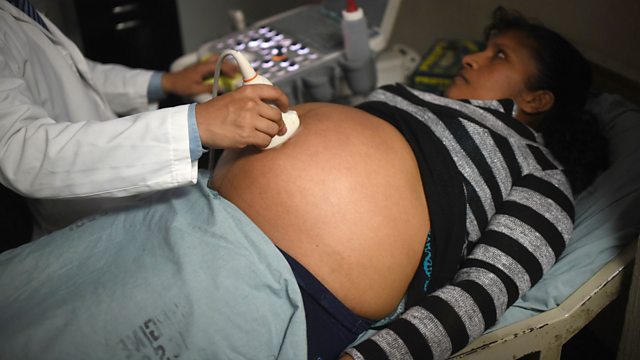What Future for Babies of Women Infected with Zika?
What does the future hold for the babies of women infected with the Zika virus in Puerto Rico?
As the first handful of locally-transmitted Zika cases were confirmed in the US state of Florida this week, in Puerto Rico nearly 800 pregnant women have been infected with the virus. The future for their babies is uncertain.
Doctors on the Caribbean island have introduced screening in the first and second trimester for all pregnant women – whether they have symptoms or not. So far it is too early for many babies to have been born with microcephaly, where the brain is smaller than it should be. Dr Carmen Zorrilla is an obstetrician who founded Puerto Rico’s Maternal Infant Studies Center. She says there has been one case of a baby with microcephaly – who sadly died.
Dr Zorrilla was instrumental in successfully eliminating mother to baby transmission of HIV on the island and now runs workshops on Zika. Worrying that as many as a fifth of the island’s population will become infected, Dr Zorrilla hopes that funding from US Congress is approved soon, so that the best possible care can be offered to pregnant women infected with Zika.
Getting around the city of Rio de Janeiro for the Olympic and Paralympic Games is still tricky for disabled athletes and spectators – in spite of improvements carried out. Money has been invested into making public transport accessible since the city won the right to host the Games. But wheelchair users and other disabled tourists face a number of obstacles when exploring the city because of badly maintained pavements and a lack of ramps to make crossing the roads easier.
New research points to a curious fact – that women who have had their appendix or tonsils surgically removed are less likely to have fertility problems. The 15-year study, published in the journal Fertility and Sterility, carried out by the University of Dundee analysed the medical records of more than half a million British women. They found that for every 100 pregnancies in women who had had no procedures, there were 149 pregnancies in women who had had their tonsils removed. The mechanism behind these findings is not fully understood but it could be a result of removing the low-level inflammation in the body, which had been caused by infected tonsils or appendixes. It is known that inflammation can adversely affect a fertilised egg’s chances of implantation in the womb.
The Dundee team favour a behavioural explanation – but hope to carry out further studies to clarify what’s behind this effect. They emphasise that the idea of women having their tonsils or appendix removed to improve their fertility is a step too far at this stage.
It is said that the first thousand days are crucial for a baby – from the time spent in the womb to the first two years of life. If a child is to thrive physically and cognitively then a good start in life is key. Yet it's estimated that 39% of children under five don’t reach their developmental potential. A new study just published in the journal Lancet has followed a group of children in Pakistan across four years. Some were included in special interventions. In high income countries there are a number of long-term studies following babies through to adulthood to see what makes a difference. But in low and middle income countries these studies are rare. Maureen Black, a distinguished fellow at Research Triangle Institute International in the United States, is impressed by the study, which was carried out by community health workers in rural Pakistan. The children whose mothers were shown how to interact in a better way with them had improved social skills, IQ and some early academic skills and social behaviour, than those whose mothers did not receive this intervention. Professor Black says that in one similar study in Jamaica, the children grew up into adults who were less likely to be involved in violence, had greater educational attainment and earned more money than their peers – so it is well worth investing in children’s early development.
(Photo: A pregnant woman getting scanned. Credit: Johan Ordonez/AFP/Getty Images)
Last on
More episodes
Previous
Clip
Broadcasts
- Wed 3 Aug 2016 21:32GMT�鶹�� World Service except East and Southern Africa & News Internet
- Thu 4 Aug 2016 01:32GMT�鶹�� World Service Americas and the Caribbean
- Thu 4 Aug 2016 02:32GMT�鶹�� World Service Online, Europe and the Middle East & UK DAB/Freeview only
- Thu 4 Aug 2016 03:32GMT�鶹�� World Service East Asia & South Asia only
- Thu 4 Aug 2016 04:32GMT�鶹�� World Service Australasia
- Thu 4 Aug 2016 06:32GMT�鶹�� World Service Europe and the Middle East & East and Southern Africa only
- Thu 4 Aug 2016 14:32GMT�鶹�� World Service except News Internet
- Sun 7 Aug 2016 19:32GMT�鶹�� World Service East and Southern Africa
Podcast
-
![]()
Health Check
Health issues and medical breakthroughs from around the world.



